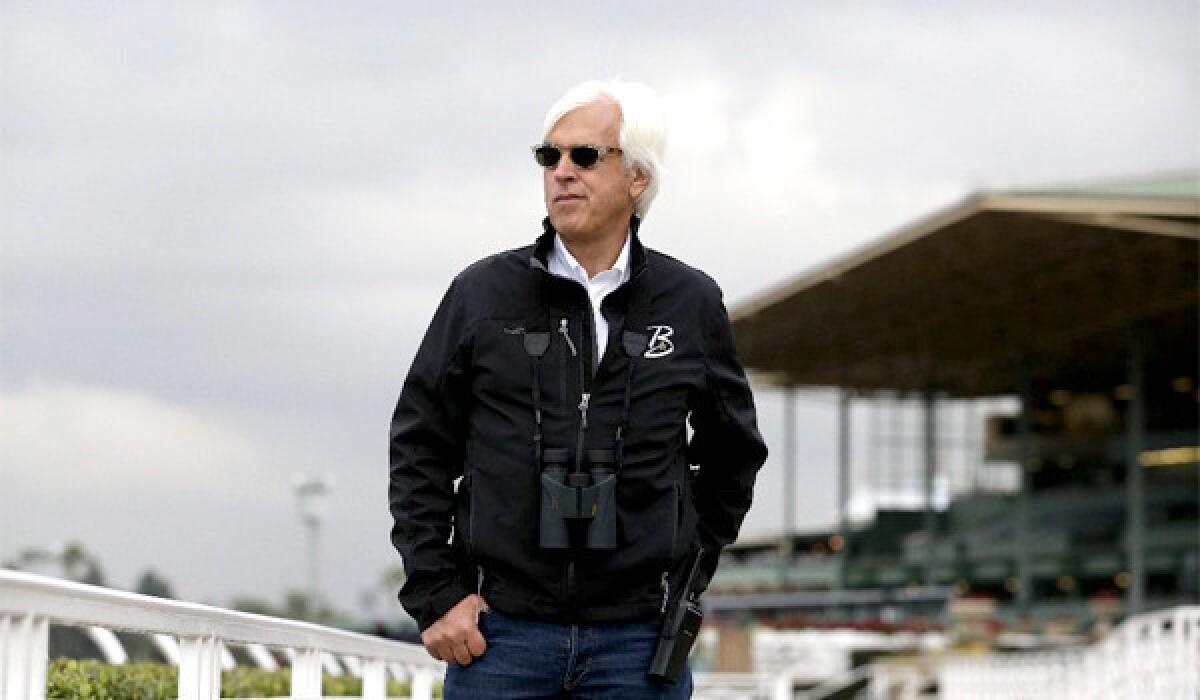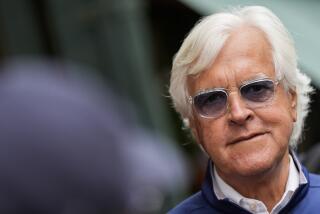Horse racing has problems, but trainer Bob Baffert isn’t one of them

Horse racing has problems, which is like saying rain makes the grass wet. It is a sport in which the toothache never goes away.
Conversely, it has its moments, its shots of adrenaline.
On a glorious November day at Santa Anita, a huge horse trained by a tiny woman and ridden by a 50-year-old grandfather who had taken seven years off won the $5-million Breeders’ Cup Classic. It was such a good story that moviemakers must be scrambling to line up Kathy Ritvo and her aptly named horse, Mucho Macho Man. The jockey part is easy. Gary Stevens already was a movie star.
But then, in racing, there is always the next day, the next month. The sport feeds millions of mouths and tantalizes millions of gamblers. It has no pause button. Just about any moment of any day, they are approaching the gate somewhere. Racing never takes a deep breath. It just pants.
Since Mucho Macho Man stole our hearts, and his trainer’s new one, here’s what has taken place, or will:
•Nov. 21: The California Horse Racing Board released its findings on a rash of sudden-death incidents at Southern California tracks. Seven were in the barn of one star trainer. The report said no wrongdoing was found.
•Nov. 22: Three trainers and a clocker at a small track in Pennsylvania, Penn National, were indicted on charges of fraud.
•Dec. 6: Frank Stronach, who owns horses and racetracks, including Santa Anita, joined a group pushing for a ban on race-day medication, including Lasix, a drug that is favored by a majority of trainers because it treats internal bleeding in thoroughbreds during races.
•Dec. 22: Hollywood Park, a national standard-bearer for the sport for 75 years, will close its doors to make room for condominiums and other real estate development.
Although none of this is life-threatening to the sport, each is a serious concern.
The Penn National issue allows those who see conspiracy around every corner to assume this is not an exception. We live in the age of Lance Armstrong, and this just feeds that.
Stronach’s anti-Lasix stance is a further indication that nobody can agree on anything in this sport, and there is no czar to make them agree. You can hate the arbitrary power of Bud Selig, David Stern and Roger Goodell, but at least their sports know where they are going, like it or not. Their sports have a central agenda. Horse racing has thousands.
Prime example: Stronach will profit nicely from trainers who disagree with him on Lasix but must run at his tracks.
But the most serious in this recent rash of events may be the star trainer with the seven dead horses. His name is Bob Baffert, and it is serious because he is among the biggest names in the sport.
Racing needs Baffert because the public knows him. He sells tickets, gets the sport on the evening news and on the front page. He’s got white hair, is quick with a good quote and has great success. Our shallow media mostly chases celebrity, and Baffert is one.
Baffert’s last horse in his tragic 16-month run went down March 14. All seven were housed at Hollywood Park in Barn 61 North, run by one of his assistants. The barn was originally built as a quarantine area for the Breeders’ Cup. According to Dr. Rick Arthur, California’s equine medical director, the barn was spotless.
The problem is, even after the CHRB report cleared Baffert — while echoing continuing puzzlement that this could happen in one barn — the negative shots keep coming Baffert’s way. The ruling body of his sport has deemed him innocent. A vocal faction in racing continues to deem him guilty.
The logic for that is thin. What motivation would a trainer have for mistreatment of a horse that leads to its death?
Arthur said in his report, “Frankly, even if you tried, you could not do something like this intentionally.”
Baffert says now, “The last thing in the world I want to be known as is a cheater. These horses are like our pets. We would never hurt them.”
Yet, the anti-Baffert agenda remains, driven by who knows what. Jealousy? An assumption that nobody could win as much as he does without cheating? A refusal to accept, as even remotely possible, the deaths of seven horses without the trainer having something to do with it?
Baffert admits he has been his own worst enemy at times. He fired back at attackers on social media. He ripped a prominent racing blogger in a TV interview. He uncharacteristically refused to respond to questions from media members he considered out to get him, instead hiring a public relations firm that put out pablum statements that only further stirred the pot of doubt.
“All mistakes,” he says now.
If Baffert is guilty of purposely doing something to harm animals, he needs to be ousted from the sport. But the only sanctioning body that can say that, the CHRB, already has said he is not. So it is time to move on.
Racing needs Baffert.
It needs the white hair, one-liners, loyal owners and sizable fan base. It needs him in the Kentucky Derby every couple of years. It needs him standing next to one of his owners, Joe Torre, when the national TV cameras come on.
The public has neither the time nor inclination to look much deeper than that, and racing badly needs that public.
In a recent interview, Baffert said words that should send shudders through the sport.
“These days,” he said, “I’m afraid to just be myself.”
More to Read
Go beyond the scoreboard
Get the latest on L.A.'s teams in the daily Sports Report newsletter.
You may occasionally receive promotional content from the Los Angeles Times.











